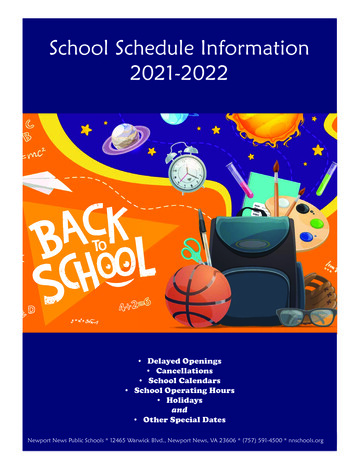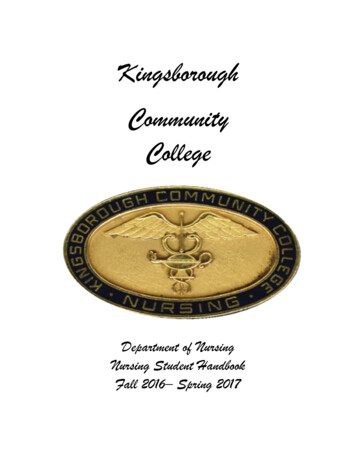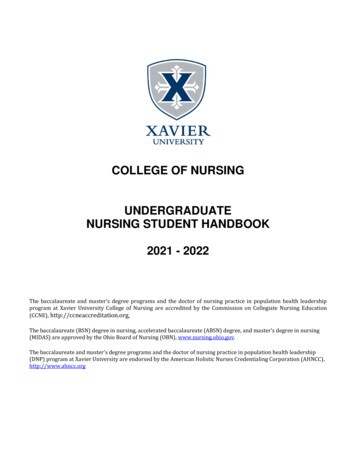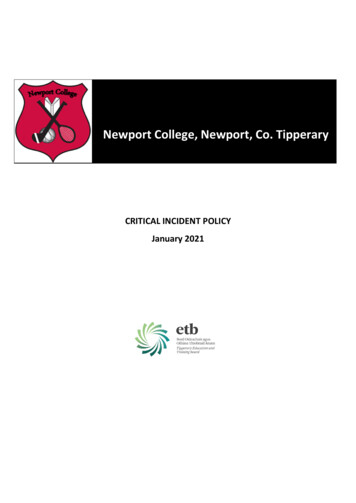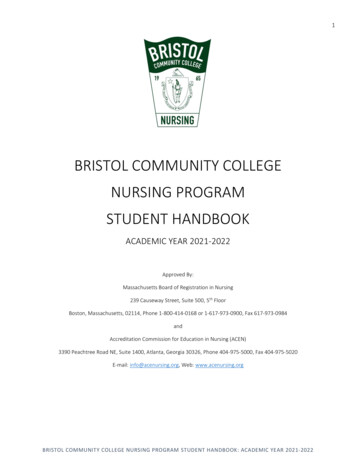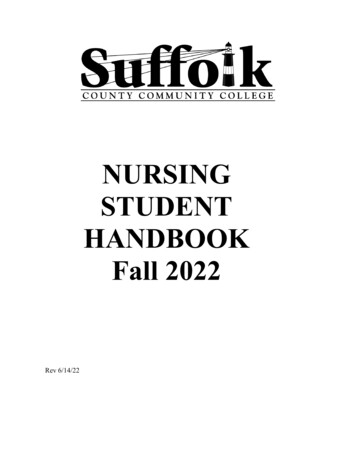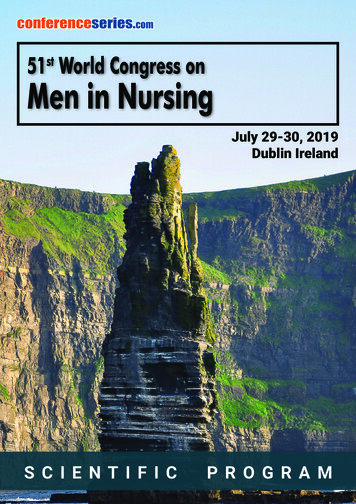
Transcription
Nursing DepartmentStudent Handbook2021-2022
WelcomeDear Nursing Student:Welcome to Arkansas State University-Newport Nursing Program. You have chosen to become amember of a health profession that is rewarding, challenging, stimulating, and demanding. This excitingcareer challenge is about to begin. The ASUN nursing program faculty wish you success as you pursueyour nursing career. So study hard, take advantage of all learning activities, and seek new learningexperiences. In addition, take responsibility for your learning. We are here to assist you to reach your goalto become a member of the nursing profession!Keys to SuccessTake full advantage of every learning opportunity. Make an effort to see the purpose of everyassignment, whether it is a reading assignment or a patient care assignment. By recognizing the purpose,every assignment becomes a learning opportunity. Do your best. Strive to discover and perform newskills. Mastery and application of the knowledge and skills required to provide quality care are of primeimportance. One measurable degree to which you achieve nursing knowledge and skill will be reflectedby your grades. Another important measure is patient satisfaction after you have taken care of them forthe day. Take time to reflect and ask yourself, “Am I providing the highest quality nursing care that Iwould want my loved ones to receive when they are a patient?” “Am I learning everything I possibly canin this course?” “How can I do things better next time?”Keep in contact with Nursing faculty. Let them know if you are having a difficult time in class orclinic. Talk with faculty early, often, and ask questions. Faculty are very helpful to successful navigationthroughout the nursing program.This policy book is provided so that you may have a full understanding of the Nursing Programphilosophy, student expectations, policies, and clinical regulations. Read it carefully as your signature inthe verification form indicates that you understand and will abide by the policies of the program.With best wishes for success,ASU-Newport Nursing Faculty, Staff, and Administration2 Page
Disclaimer:Every effort has been made to ensure the accuracy of the material contained within this handbook.However, all policies, procedures, clinical information/documentation, program information, and feesare subject to changes at any time by appropriate action of the faculty, the college administration, theDirector of Nursing, the Dean of Nursing and Health Professions, ASU System Board of Trustees, and theArkansas State Board of Nursing without prior notification. The provisions of the Nursing ProgramHandbook do not constitute a contract between the student, the college, or the nursing program. Theinformation in this handbook is for use as an academic tool and is subject to change at any time. TheNursing Program Handbook may undergo changes following a student’s admission & progression in thenursing program. Students will be responsible for and held to changes in the handbook. Nursing studentswill be notified of handbook changes.The ASUN Practical Nursing Certificate program is fully approved by the Arkansas State Board of Nursing.University Tower Bldg. 1123 South University Suite 800 Little Rock, AR 72204 (501) 686-2700.The ASUN Associate of Applied Science in Nursing Registered Nursing Program has Full Approval by theArkansas State Board of Nursing. University Tower Bldg. 1123 South University Suite 800 Little Rock, AR 72204(501) 686-27003 Page
Table of ContentsDescriptionFaculty and StaffOffice HoursASUN Vision, Mission, and ValuesASU Nursing Department MissionNursing Department PhilosophyNursing Department ValuesPN Graduate CompetenciesPN Curriculum PlanPN Course DescriptionsRN Graduate CompetenciesRN Curriculum PlanRN Course DescriptionsProgram CostRefund PolicyFinancial AidAdmission Standards for Practical NursingAdmission Standards for Registered NursingRegistration ProceduresReadmissionAdvance PlacementCriminal Background CheckCellphone UseClinical AssignmentsClinical Facility PoliciesCommunication PolicyUrine Drug Screen PolicyInstructor-Student ExpectationsLiability InsuranceOHSA RegulationsSocial NetworkingStudent HealthMental and Physical AbilitiesHepatitis VaccinationPatient Safety and Prescription MedicationHealth Care CostUpdating Health informationImmunizationsPersonal Attributes and Professional BehaviorHIPAADress CodeSmoking and Tobacco UseAttendanceCourtesyCourse Evaluation CriteriaGrade Distribution4 3131-3232-333334343535
Written EvaluationTest Score ChallengeTest ChallengeATI AssessmentProject and Assignment Evaluation CriteriaSkills Laboratory EvaluationSimulation and Skills LabStudent Information ReleaseClinical/Practicum EvaluationCritical Learning ObjectivesSupervision of Medication Administration/Invasive ProceduresDocumentation of PerformanceAcademic Progression/Graduating RequirementsRemediationNursing Due ProcessDismissalStudent Academic Grievance ProcedureAcademic Misconduct Appeals ProcessStudent GovernanceAppendix A: Urine Drug Screen PolicyAppendix B: Instructor-Student OutcomesAppendix C: Student Withdrawal FormAppendix D: Program Dismissal FormAppendix E: Student Handbook Acknowledgment Form5 142-4445-474849-5051-53
Section I: Introduction6 Page
Faculty and StaffFaculty and staff members are available to assist and advise. Due to the changes in the nursing programs,student enrollment, and program needs, this list may change. Updates to the handbook will be completedannually. Communication via email is the most efficient when attempting to contact faculty.AdministrationHolly Smith,Ed. DTyphanie Myers,Ed. DStacie Hay, BSN,RNFacultyTracy Porter,BSN, RNRoleVice ChancellorforAcademicAffairsDean of Nursingand HealthProfessionsDirector of NursingOfficeWH 151EmailHolly smith@asun.eduPhone870-512-7704WH 166Typhanie myers@asun.edu870-512-7719WH 169Stacie Hay@asun.edu870-512-7869RoleInstructor ofRegistered NursingOfficeEmailtracy porter@asun.eduPhoneRegena White, BSN, Instructor ofRNRegisteredNursingMary Baker, RNAdvanced Instructor WRHof Practical Nursing 132regena white@asun.edumary baker@asun.edu870-512-7759Tammy Collier,RNTammy collier@asun.edu870-680-8716870-358-8626Tonya Holden,BSN, RNRoxanneMontgomery,BSN,RNLatisha Clark, RNAmanda Walters,RNAdministrativeSupportSheila McNealAdvanced Instructor NAHBof Practical Nursing 414AdvancedInstructor ofPractical NursingAdvanced NursingInstructor ofPractical NursingInstructor ofPractical NursingBuildingA 109Tonya holden@asun.eduNAHB415Roxanne montgomery@asun. 870-512-7820eduWRH105Latisha clark@asun.edu870-512-7712Clinical andSimulationCoordinatorRoleWRHAmanda walters@asun.edu870-512-7762OfficeEmailPhoneWH 165Sheila ce HoursThe faculty office hours are posted outside the faculty offices. Please call or email the faculty in advanceto schedule an appointment.7 Page
Arkansas State University-Newport Vision and MissionVisionASU-Newport will be the driving force that revitalizes the Delta and restores the American Dream in thecommunities we serve.MissionASU-Newport provides an accessible, affordable, quality education that transforms the lives of ourstudent’s, enriches our communities and strengthens the regional economy.Values CommunityDiversityInnovationIntegrityStudent FocusTrustArkansas State University-Newport Nursing Mission, Philosophy, and ValuesMission of the Nursing DepartmentThe purpose of the Arkansas State University-Newport Nursing Department is to prepare students asentry-level nurses who provide effective, safe, competent, and appropriate nursing care to diversepopulations in a variety of health care delivery settings. In addition, ASUN nursing programs fosterintellectual curiosity and a commitment to life-long learning for personal and professional growth.Philosophy of the Nursing Department Nursing is an art and a science: the embodiment of caring. It consists of a unique, integrated bodyof knowledge and requires critical thinking, decision making, and problem-solving skills. Nursing addresses holistic human responses to varying levels of health in a variety of settings andis concerned with illness prevention, health promotion, and health maintenance. Nurses activelycollaborate with other healthcare professionals to promote safe, holistic care of their clients. Theyprovide care to individuals, families, groups, and communities. Nursing requires commitment andresponsibility to society and the profession. The individual is unique and multidimensional being with inherent worth and dignity. Individualsinteract with the environment in a dynamic process, which requires change over time. Individualshave the capacity to care, to learn, and to change. They have the right to determine and participatein activities that affect their health status, and therefore are responsible for their actions. Learning is a life-long, interactive process that builds on previous experience and ideally resultsin a change in attitudes, beliefs, and /or behaviors. Learning occurs in a variety of environmentsand involves the cognitive, affective, and psychomotor domains. Professional nursing education is built on an integrated study of the natural sciences, socialsciences, and humanities in order to promote critical thinking, caring, respect, and concern forindividuals, families, communities, and societies. This integrated program of nursing science andGeneral Education is designed to develop an appreciation for the arts and sciences, whichcontributes to an individual’s understanding of and participation in society as a whole.8 Page
The faculty members are responsible as role models, mentors, and teachers for providing a caringenvironment in which students are free to explore and develop personally, professionally, andintellectually.Values of the Nursing Department TrustRespectProfessionalismLearning is an active processLife-long learning.9 Page
ASUN Practical Nursing ProgramASUN Practical Nursing Program Graduate Competencies:1.Provide quality, safe, holistic, patient-centered nursing to diverse patient populations across thelifespan guided by a caring attitude and effective delegation.2.Engage in critical thinking and prioritization necessary to provide quality patient care.3.Participate in the development of quality improvement measures for diverse patient populations.4.Participate in collaborative relationships with members of the inter-professional team.5.Use informatics principles, techniques, and systems, and patient care technology to communicate,process knowledge, mitigate error, and support decision-making.6.Provide leadership in a variety of healthcare settings for diverse patient populations withinthe Licensed Practical Nurse’s scope of practice.7.Function as a competent nurse assimilating professional, ethical, and legal guidelines inpractice asa Licensed Practical Nurse.Practical Nursing Curriculum PlanCourse NumberGeneral 4BIOL 2414Nursing CorePN1213PN1406PN2213PN2406PN2106PN2402Total Credit for PN Program:10 P a g eCourse TitleCredit HoursComposition IIntroduction to NutritionMath for HealthProfessionsBody Structure andFunctionHuman A& P I with labHuman A&P II with Lab333Nursing Process INursing Practicum INursing Process IINursing Practicum IIMaternal-Newborn andFundamentals of PediatricNursingMaternal-Newborn andFundamentals of PediatricNursing Practicum1361366444259-63 Credit Hours
The ASUN Practical Nursing Program prepares students to take the professional nursing licensure exam(NCLEX-PN) upon successful completion of the classroom and clinical coursework. Curriculum is basedon an 11-month (Three semesters) plan for full-time students, who have completed all general educationpre-requisite courses. After successful completion of pre-requisite general education coursework, studentsare eligible to apply for acceptance into the Practical Nursing Program. Acceptance into this program isdependent upon meeting the admission criteria and available space. Admission criteria are covered inSection II.*Successful competition of the PN program does not guarantee licensure or approval to take theNCLEX- PN/RN exam.Practical Nursing Course DescriptionsBIOL1404 Body Structure and Function:A course in anatomy and physiology wherein the function of each of the organ systems are studied.Emphasis will be placed on the nervous, musculoskeletal, cardiovascular, respiratory, excretory, andendocrine systems. Designed for majors in medical technology, radiology, home economics, physicaleducation, psychology, and secondary education with teaching emphasis in biology. 4 Credits.BIOL2013 Introduction to Nutrition:A study of human nutritional needs over the human life span. Individual nutrients, their nature, functions,and their processing by the human body. Dietary analyses and evaluations. Food labels and theirinterpretation, weight control, exercise, food safety, relationships of nutrition to health and theenvironment. 3 Credits.BIOL2404 Human Anatomy Physiology I and Lab:Structure and function of cells, tissues, integumentary system, skeletal system, muscular system, nervoussystem. 4 Credits. ACTS Equivalency: BIOL 2404BIOL2414 Human Anatomy Physiology II and Lab:Structure and function of special senses, endocrine, circulatory, digestive, respiratory, excretory andreproductive systems, acid base balance, and fluid balance. 4 Credits. ACTS Equivalency: BIOL 2414*Note - Human Anatomy and Physiology I and Human Anatomy and Physiology II must be taken at thesame institution to be transferable or gain acceptance into some programs.ENG1003 Composition I:Instruction in expository essay form, structure, and style. Prerequisite: ACT score of 19 or better in bothEnglish and Reading or successful completion of ENG0053 English Fundamentals. 3 Credits. ACTSEquivalency: ENGL1013.MATH12131 Math for Health Professions:Provides instruction in dosage calculation using ratio to proportion as well as other means of calculationrelated to medication. Topics include; interpretation of drug labels, syringe types, conversions, militarytime, reconstitution, mixing medications, IV flow rates, and drip rates, interpretation of physician orders,dispensing, and proper documentation of medication. 3 Credits.11 P a g e
PN1213 Nursing Process I:Nursing Process I includes the fundamentals of nursing, medication administration, mental health, andmedical-surgical content focusing on adult and geriatric clients. This course examines both preventionand promotion of well-being. In addition, this course will focus on growth and development, commondisease processes, and nursing care of the client throughout the lifespan. Pharmacology and nutrition areintegrated into this course or the promotion of holistic care. 13 Credits.PN1406 Nursing Practicum I:Nursing Practicum I integrates and enhances the knowledge gained in Nursing Process l. This courseincludes fundamentals of nursing, medication administration, mental health, and medical-surgical contentfocusing on adult and geriatric clients. As the student advances through the clinical experience,progression from basic skills to more complex skills will occur. 6 Credits.PN2106 Maternal-Newborn and Fundamentals of Pediatric Nursing:Explores the components of maternity nursing including communication skills, prenatal care, high riskpregnancy, labor and delivery, postpartum care, family planning, care of the newborn including high-risknewborn. This course builds on the basic concepts of nursing principles, meeting the needs of pediatricclients and their caregiver(s), and the behavior of the well child and the child experiencing illness. 6Credits.PN2213 Nursing Process II:Nursing Process II is a continuation of care for the adult client and explores fundamental care of thepediatric client. This course examines prevention, promotion of well-being, management, and delegationwithin the scope of the Licensed Practical Nurse. In addition, this course will focus on growth anddevelopment, common disease processes, and nursing care of the client throughout the lifespan.Pharmacology and nutrition are integrated into this course for the promotion of holistic care. 13 Credits.PN2402 Maternal-Newborn and Fundamentals of Pediatric Nursing Practicum:Will integrate and enhance knowledge gained in Maternal-Newborn and Fundamentals of PediatricNursing and Practicum l. This practicum experience will include communication skills, prenatal care,high-risk pregnancy, labor and delivery, postpartum care, family planning, care of the newborn includinghigh-risk newborn. This practicum experience includes the fundamental care of the pediatric client with afocus on promotion of wellness and the care of the child with illness. 2 Credits.PN2406 Nursing Practicum II:Nursing Practicum II expands the foundation of Nursing Practicum I by integrating and enhancing theknowledge gained in Nursing Process ll. This course includes the care of the adult and pediatric clientwith a focus on management and delegation within the scope of practice of the Licensed Practical Nurse.6 Credits.12 P a g e
ASUN Registered Nursing ProgramASUN Registered Nursing Program Graduate Competencies:1. Advocate holistically for diverse patient populations and their families in ways that promote health,self-determination, integrity, and ongoing growth as human beings.2. Integrate clinical reasoning, substantiated with evidence, to provide and promote safe quality care forpatients and families in a community context.3. Distinguish one’s professional identity in ways that reflect integrity, responsibility, andethical practices, and professional growth and development as a nurse.4. Communicate respectfully and effectively with diverse populations and the multidisciplinary healthcare team through collaborative decision making to produce optimal patient outcomes.5. Manage patient care effectively related to time, personnel, informatics, and cost to continuouslyimprove the quality and safety of health care systems.Registered Nursing Curriculum PlanCourse NumberGeneral EducationENG 1003ENG 1013MATH 12131MIS 1033PSY 2013PSY 2533BIOL 2013BIOL2404BIOL 2414BIOL 2004Nursing CoreNRS 1109NRS 1208NRS 1311NRS 2311NRS 2031Total Credit Hours13 P a g eCourse TitleCredit HoursEnglish Composition IEnglish Composition IIMath for Health ProfessionsIntroduction to ComputersIntroduction to PsychologyLifespan DevelopmentIntroduction to NutritionHuman Anatomy andPhysiology I with labHuman Anatomy andPhysiology II with LabMicrobiology with Lab33333334Nursing Concepts andExperience INursing Concepts andExperience IINursing Concepts andExperience IIINursing Concepts andExperience IVNCLEX Preparation94481111173
The ASUN Associate Degree Nursing Program prepares students to take the professional nursinglicensure exam (NCLEX-RN) upon successful completion of the classroom and clinical coursework.Curriculum is based on a 2-year (four-semester) plan for full-time students, who have completed allgeneral education pre-requisite and co-requisite courses. After successful completion of pre-requisitegeneral education coursework, students are eligible to apply for acceptance into the Associate of AASRegistered Nursing Program. Acceptance into this program is dependent upon meeting the admissioncriteria and available space. Admission criteria is covered in section II.*Successful competition of the AAS RN program does not guarantee licensure or approval to take theNCLEX- PN/RN exam.Registered Nursing Course DescriptionsBIOL2004 Microbiology with LabThe study of organisms, in particular bacteria, involving their structure and function at a molecular leveland interaction of the organisms with humans and their environment. Knowledge of basic chemistrystrongly recommended. 4 Credits. ACTS Equivalency: BIOL 2004BIOL2013 Introduction to NutritionA study of human nutritional needs over the human life span. Individual nutrients, their nature, functions,and their processing by the human body. Dietary analyses and evaluations. Food labels and theirinterpretation, weight control, exercise, food safety, relationships of nutrition to health and theenvironment. 3 Credits.BIOL2404 Human Anatomy and Physiology I with LabStructure and function of cells, tissues, integumentary system, skeletal system, muscular system, nervoussystem. 4 Credits. ACTS Equivalency: BIOL 2404.BIOL2414 Human Anatomy and Physiology II with LabStructure and function of special senses, endocrine, circulatory, digestive, respiratory, excretory andreproductive systems, acid base balance, and fluid balance. 4 Credits. ACTS Equivalency: BIOL 2414.*Note - Human Anatomy and Physiology I and Human Anatomy and Physiology II must be taken at thesame institution to be transferable or gain acceptance into some programs.ENG1003 Composition IInstruction in expository essay form, structure, and style. Prerequisite: ACT score of 19 or better in bothEnglish and Reading or successful completion of ENG0053 English Fundamentals. 3 Credits. ACTSEquivalency: ENGL1013.ENG1013 Composition IIA continuation of ENG1003 with the addition of research papers and literary genres. Prerequisite:ENG1003. 3 Credits. ACTS Equivalency: ENGL1023.MATH1213 Math for Health Professions (Previously named Math for Nurses)Provides instruction in dosage calculation using ratio to proportion as well as other means of calculationrelated to medication. Topics include; interpretation of drug labels, syringe types, conversions, militarytime, reconstitution, mixing medications, IV flow rates, and drip rates, interpretation of physician orders,dispensing, and proper documentation of medication. 3 Credits.14 P a g e
MIS1033 Introduction to ComputersA required introductory course for all degree-seeking students. This course introduces the student to thecomponents of microcomputer systems and to the application of software packages for microcomputersystems. Students will gain “hands-on” experience using popular business application software, includingword processing, e-mail operations, spreadsheets, and presentation graphics. 3 Credits. ACTSEquivalency: CPSI 1003.PSY2013 Introduction to PsychologyA scientific study of behavior and cognitive processes. This course covers a wide range of humanbehavior. 3 Credits. ACTS Equivalency: PSYC 1103.PSY2533 Life Span DevelopmentA study of the transformation in human development from pre-birth to death. Usually required fornursing, psychology, and social work majors. Prerequisite: PSY2013. 3 Credits. ACTS Equivalency:PSYC2103.NRS1109 Nursing Concepts and Experience IThis course provides the traditional RN student to an introduction to nursing curricular concepts, roleresponsibilities, development of nursing fundamental knowledge and skills. The course combines theoryand practicum experiences. The following concepts will be introduced to beginning students: Quality andSafety for Nurses (QSEN), patient-centered care, interdisciplinary collaboration and relationships,evidence-based practice, informatics, the nursing process, and categories of the basic patient needs.Morning, afternoon, and/or evening hours may be scheduled for clinical experience. A pharmacologicalwith calculations exam will be given. Each student will be required to achieve 90% on the calculationtest to pass the course.Prerequisite: Acceptance to RN program, ENG 1003, MATH 1213, and BIOL 2404 must be passed with agrade of “C” or betterCo-requisite: BIOL 2414 and PSY 2533,NRS1208 Nursing Concepts and Experience IIThis course integrates nursing curriculum concepts, evidence-based practice from the previous nursingcore, and pre-requisite courses with a focus on patient aligned care. The emphasis is placed in long andshort-term health problems in the areas of maternal and children’s health. Student learning outcomesinclude the application of quality and safety educational standards (QSEN) and clinical decision-making.Students will focus on specified nursing problems in relation to developmentally and culturally diversepatients and families. The outcomes will include collaboration with the health care team, the areas ofhealth promotion, maintenance, and restoration. Knowledge and skills from previous courses arereinforced and related to new content. Clinical experiences will focus on patient responses in the area ofmaternal and child health, primarily in acute care settings. Clinical experiences are scheduled involvingmorning, afternoon, evening, or weekend hours in a variety of settings focusing on course concepts.Prerequisite: NRS 1109 and BIOL 2414 must be passed with a “C” or betterCo-requisite: MIS 1033NRS1311 Nursing Concepts and Experience IIIThe focus of Nursing Process II is on clinical decision-making, and the delivery of patient-centered carein selected medical/surgical settings with adult patients. Curricular concepts from previous coursescontinue to be built upon and a unit focusing on gerontological nursing. Content and clinical experiences15 P a g e
will emphasize patient-centered care, the role of the nurse in the health care team, communication skills,interdisciplinary collaboration, and quality and safety. Clinical experiences are scheduled involvingmorning, afternoon, evening, or weekend hours in a variety of settings focusing on course concepts.Prerequisite: NRS 1208, must be passed with a grade of “C” or betterNRS2031 NCLEX PreparationNCLEX preparation course is a review of all nursing content from the latest test plan of the NationalCouncil of State Boards of Nursing Licensure examination. The course includes content review, practicetest questions, and strategies and techniques to optimize the pre-licensure nursing student testing ability.Prerequisite: NRS 1311, MIS 1033 and BIOL 2004 must be passed with a grade of “C” or betterCo-requisite: NRS 2411Students may only be enrolled or lacking one general education course before the beginning of the term.NRS2411 Nursing Concepts and Experience IVNursing Process II is nursing of the adult patient with common recurring health alterations. It includesadvanced nursing interventions based on physiological and psychological needs of adult patients. Thiscourse builds on concepts of commonly recurring health alterations presented in Nursing Process III(NRS 1309). Students apply the nursing process and utilize information literacy skills to demonstrateclinical decision-making that is grounded in evidence-based practice to achieve best practice outcomes.The physiological and psychological needs of the adult patient are addressed through Quality and Safetyfor Nurses (QSEN), incorporating the concepts of patient-centered care, teamwork, and collaboration,evidence-based practice, safety, quality improvement and informatics. The principles of priority setting,leadership, and delegation are incorporated throughout the course. Clinical experiences are scheduledinvolving morning, afternoon, evening, or weekend hours in a variety of settings focusing on courseconcepts.Prerequisite: NRS 1311, MIS 1033 and BIOL 2004 must be passed with a grade of “C” or betterStudents may only be enrolled or lacking one general education course before the beginning of the term.16 P a g e
Program CostFor a listing of tuition and fees associated with the nursing programs, please refer to the ASUN Tuitionand Fees worksheet available at https://www.asun.edu/tuition and fees. In addition to tuition and fees,students will be responsible for program equipment including uniforms, lab coat, shoes,skills bag,and stethoscope. Students are also responsible for any costs related to travel to and from clinicallocations.Refund PolicyThe Nursing Department at Arkansas State University-Newport follows ASUN’s withdrawal and refundpolicy. Please refer to ASUN’s Academic Calendar for specific dates.https://files.asun.edu/academics/academic calendar/2019-2020 AcademicCalendar.pdfFinancial AidPlease follow this link to ASUN’s Financial Aid Page. http://www.asun.edu/financial aid17 P a g e
Section II: Practical Nursing and Associate ofApplied Science Nursing (RN) ProgramAdmission Information18 P a g e
Admission Standards for Practical Nursing ProgramIn addition to the ASUN admission requirements, students must complete the application process to thePractical Nursing (PN) program. The application guidelines and requirements, as well as the applicationdeadline, can be found on the ASUN website. Once all preliminary requirements are met and studentsreceive official acceptances, the students are then eligible to begin the PN courses.Prospective students should be aware that declaring nursing as a major does not guarantee admission tothe PN program; it is an indication of interest. Successful completion of the college readiness, prerequisite general education courses does not guarantee acceptance into the PN Program, as it is a highlycompetitive program. Acceptance into the PN program is based on a point system, which is detailed in theacceptance process section.Acceptance ProcessASUN has a limited number of seats in its PN program. Every effort is made to allow students to progressfrom pre-nursing courses to PN program courses in a timely fashion. However, with limited seatsavailable, there are certain criteria each student must meet. The following criteria must be met to beeligible for acceptance into the PN program:1. The following general education prerequisite courses must be completed with a grade of “C” orbetter:a. English Composition Ib. Math for Health Professionsc. Introduction to Nutritiond. Body Structure and Function ORHuman Anatomy and Physiology I with lab ANDHuman Anatomy and Physiology II with Lab2. Course work: All prerequisite courses must be completed prior to application deadline.3. PN En
The ASUN Practical Nursing Certificate program is fully approved by the Arkansas State Board of Nursing. University Tower Bldg. 1123 South University Suite 800 Little Rock, AR 72204 (501) 686-2700. The ASUN Associate of Applied Science in Nursing Registered Nursing Program has Full Approval by the Arkansas State Board of Nursing.

